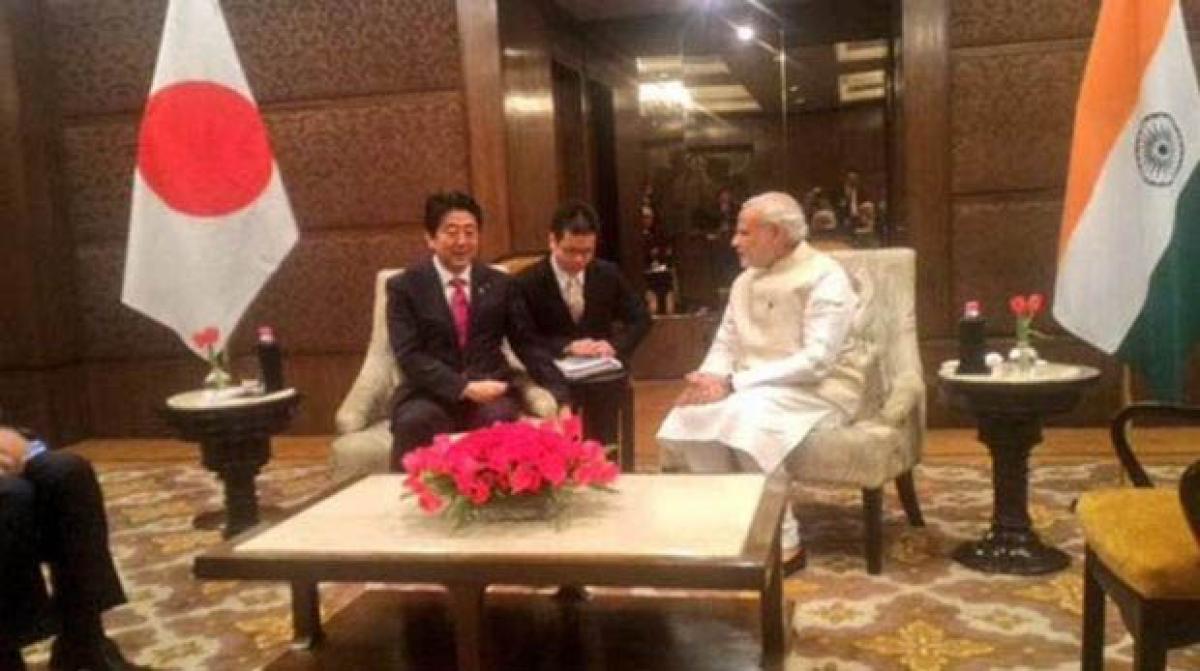Live
- Casual yet stylish office outfits for all-day comfort
- TTD to suspend all special darshans from January 10 to 19 amid Vaikuntha dwara darshans
- Naidu pats TDP leaders, cadres for enrolling 73L members
- Rupali Ganguly says for 20 years she never got an award
- Advanced anti-drone systems deployed for devotees’ safety at Mahakumbh
- Workshop on ‘Industry-Academia Practices in Civil Engineering’ concludes
- Revanth assures Kurma community of its due
- 204 cadets pass out of AFA
- Youngest chess king wins laurels for India
- FairPoint: Rahul’s rhetoric falls flat as PM Modi steals spotlight
Just In

x
Highlights
Prime Minister Narendra Modi on Saturday said the \'Make in India\' initiative has become a movement in Japan and the island nation has created a fund of about USD 12 billion for it.
Prime Minister Narendra Modi on Saturday said the 'Make in India' initiative has become a movement in Japan and the island nation has created a fund of about USD 12 billion for it.
.jpg)
"Today, there is a 'Make In India' movement in Japan. I have been told that USD 11-12 billion fund has been earmarked for it. This clearly indicates how both the countries can move forward," he said while addressing the India-Japan Business Leaders Forum here.
'Make in India' is proceeding in mission mode, not just in India, but also in Japan, he added.
Modi also said that for the first time Japan will import cars from India. "Maruti (Suzuki) will manufacture here... Japanese company will manufacture here and export it to Japan," he said, adding that both India and Japan should move ahead together, not just in the sphere of high-speed trains, but also for "high-speed growth."
Recalling his last visit to the country, Modi said Japan committed an investment of USD 35 billion.
"The figure had surprised many at that time, but today, within a short time-span, unimaginable progress had been made, and the contours of this investment were beginning to get visible on the ground," he said.
Highlighting the improvement in economic indicators in both India and Japan, he said these were extremely encouraging, especially in the light of the global economic slowdown.
"It is clear that India is a land of possibilities," he added.
Praising Modi's reforms programme, Japanese Prime Minister Shinzo Abe said, "Prime Minister Modi's speed of implementing policies and reforms is like Shinkansen (bullet train) and his reform agenda is as safe as Shinkansen."
Abe also said that India has become a very attractive investment destination for Japan.India and Japan are likely to finalise an agreement on protection of military information during Abe's trip that will the lay the ground for Japanese arms sales to India, including seaplanes.
Abe and Modi have forged close economic and defence ties aimed partly at pushing back against China's growing assertiveness in the region. Both are embroiled in territorial disputes with China.
Officials in Tokyo and New Delhi said the two sides were negotiating a defence technology transfer agreement and another on sharing of military information that are necessary before Japan can sell weapons to India and collaborate on military technology.
Japan is aiming to make progress on the two defence pacts during Abe's three-day visit, a Japanese foreign ministry official said in Tokyo. An Indian defence ministry official said the broad parameters of the framework agreement were in place.
India and Japan have been holding talks for two years on the purchase by India of US-2 amphibious aircraft made by ShinMaywa Industries, which will be one of Japan's first arms sales since Abe lifted a 50-year ban on weapon exports.
India wants two of the seaplanes off the shelf and the remaining 10 to be manufactured in India, with an Indian partner, as part of Modi's push to build a defence industrial base.
The Indian defence official said he did not expect the deal, estimated to be worth $1.1 billion, to be announced immediately.
Abe, making a third trip to India since he became prime minister, pledged stronger maritime ties, also involving its ally, the United States, in a three-way relationship that has irked China in the past.
"In order to maintain an open, free and peaceful sea, it becomes important more and more for there to be collaboration between Japan and India, as well as the international community including the US," he said.
Modi's cabinet this week cleared a $14.7 billion Japanese proposal to build a bullet train line between Mumbai and Ahmedabad, giving Japan an early lead over China, which is conducting feasibility studies for high speed trains on other parts of the Indian rail network.

Next Story
More Stories
ADVERTISEMENT
© 2024 Hyderabad Media House Limited/The Hans India. All rights reserved. Powered by hocalwire.com







